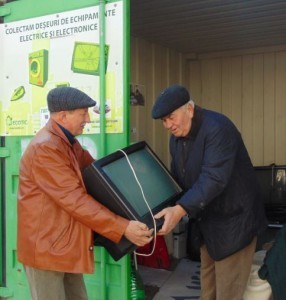ECOTIC published the results of a new study - "Evaluating the attitude of the Romanian public on WEEE and battery waste". The study w as finalized in May 2016 and is part of the ECOTIC Caravan project, which was funded through EU’s LIFE + program.
as finalized in May 2016 and is part of the ECOTIC Caravan project, which was funded through EU’s LIFE + program.
Two research reports were issued - one in 2014, at the start of the project, and one at the end, in 2016, with the purpose of identifying the changes in behavior, attitude and awareness of the Romanian public on WEEE and battery waste collection and recycling.
Figures show that a significant part of Romanians (41.3%) still have an adverse opinion on the current waste collection and recycling mechanisms. Most consider the current solutions offered to the public as insufficient and say there is a real need for more facilities dedicated to selective waste collection as well as local services for household waste disposal.
Actually these are the most important barriers that prevent proper collection and recycling of WEEE: 33.9% of the respondents consider the lack of selective collection facilities (collection points) as the main barrier, followed by the lack of information; 24.2% of respondents do not know the location of available collection points.
26% of respondents were spontaneously aware that WEEE is recyclable waste; the percentage is higher than that registered in 2014. Another positive aspect is the fact that the percentage of people who say they give out waste to scrap collectors is down to half.
People say they are more willing to collect and correctly dispose of WEEE, being more aware of the buy-back mechanisms available in stores, of the possibility of handing over a piece of WEEE in a store or through a specialized company. Still, a quarter of the respondents still do not know where to hand over this type of waste.
At the same time, people are more aware of the components inside WEEE, both those that are recyclable and those dangerous for the man's health and for the environment.
In conclusion, the study shows a positive change of behavior, attitude and awareness on WEEE collection and recycling. There is however the need for more extensive and firm action, especially on the part of public authorities - both local and central - to increase the speed at which the collection infrastructure for WEEE is put in place.
The study was conducted on a representative sample of 1000 people from urban areas, with a maximum permissible margin of error of 3.1%.
